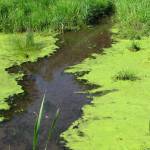Get Rid of Mosquitoes to Reduce Disease Risk for Horses

Several equine diseases, including West Nile virus, are spread when horses are bitten by infected mosquitoes. These insects lay their eggs in standing water, but not in moving streams. By making a careful property survey and eliminating places were mosquitoes breed, owners of horse farms can reduce the insect population and lessen the chance of disease. It takes only a very small amount of quiet water to support life cycle of a mosquito, so it’s important to be diligent about seeking out and emptying every place that water is being held.
Small rainwater puddles that drain within hours are not a problem, but if water stands for several days, such as in a birdbath or swampy area, mosquitoes can make use of it.
For ditches, wheel ruts, or deep tracks in areas where heavy equipment is parked, consider filling the areas with gravel that will let the water move but won’t allow mosquitoes access to its surface. Tiling, using perforated pipe, or constructing a French drain are other options. Check with a geotechnical engineering firm or the local agricultural extension service for instructions.
Walk around the barn area, along fence lines, and near sheds and equipment storage areas and note anything that holds water. Empty and store buckets, pick up unused tarps, and cut drainage holes in tires and other objects that can’t be moved. Remember to look high (clogged gutters, rain standing on flat roofs) and low (rainwater pools under sheds, areas leading to drains or culverts).
Established ponds, dammed streams, and wetland areas may be treated with larvicidal chemicals in some areas, while this step is prohibited by law in other areas. Check with the Department of Natural Resources in your region to see which guidelines apply.
Water troughs for horses, wading pools for children, drinking bowls for dogs, and birdbaths should be emptied, cleaned, and refilled at least every three or four days. This breaks the cycle of egg laying and larvae development as well as preventing a buildup of algae in the water.
Using fly spray, turning barn lights off at night, keeping horses in from dusk to dawn, and avoiding grazing areas adjacent to wetlands are steps that can minimize mosquito contact for your horses. Mosquitoes like quiet air as well as quiet water, so breezy areas are best for equine turnout. Stall-front fans can also keep the air moving, discouraging mosquitoes.








